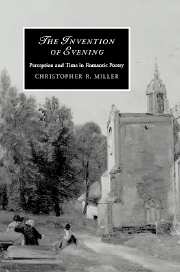Book contents
- Frontmatter
- Contents
- Acknowledgements
- Introduction
- 1 The pre-history of Romantic time
- 2 Coleridge's lyric “moment”
- 3 Wordsworth's evening voluntaries
- 4 Shelley's “woven hymns of night and day”
- 5 Keats and the “Luxury of twilight”
- 6 Later inventions
- Notes
- Bibliography
- Index
- CAMBRIDGE STUDIES IN ROMANTICISM
5 - Keats and the “Luxury of twilight”
Published online by Cambridge University Press: 04 May 2010
- Frontmatter
- Contents
- Acknowledgements
- Introduction
- 1 The pre-history of Romantic time
- 2 Coleridge's lyric “moment”
- 3 Wordsworth's evening voluntaries
- 4 Shelley's “woven hymns of night and day”
- 5 Keats and the “Luxury of twilight”
- 6 Later inventions
- Notes
- Bibliography
- Index
- CAMBRIDGE STUDIES IN ROMANTICISM
Summary
John Keats once suggested in a letter to his publisher that the ideal poem ought to have an effect on the reader as gradual and subtly modulated as the passing of a day: “the rise the progress, the setting of the imagery should like the Sun come natural too [sic] him – shine over him and set soberly although in magnificence leaving him in the Luxury of twilight.” This chapter explores the implications of that axiom in Keats's poems; but I would first like to consider what the poet meant by his metaphor. Notably, Keats represents lyric as a dynamic, temporal process rather than as a static thing; and as an event in the reader's mind as much as in the poet's. By likening the lingering effect of that event to “the Luxury of twilight,” he implies that poetry ought to provide sensory as much as intellectual delight: both the dilatory pleasures of a walk at dusk and the contemplation that might attend such a walk.
Keats favored the word “luxury,” and its particular resonance for him can be discerned in his marginalia to Paradise Lost, where he noted in Milton a kindred “passion for what is properly the sense of ease and pleasure poetical Luxury,” but added that his predecessor ultimately “devoted himself rather to the Ardours than the pleasures of Song.”
- Type
- Chapter
- Information
- The Invention of EveningPerception and Time in Romantic Poetry, pp. 145 - 176Publisher: Cambridge University PressPrint publication year: 2006



